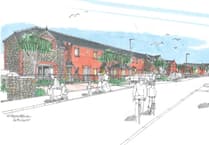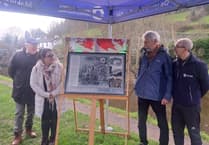A PROTOTYPE of the world’s most efficient and eco-friendly car has been unveiled by a team in Llandrindod Wells.
The Rasa, built by the Llandrindod Wells company Riversimple, is a hydrogen-powered car which is designed to produce as little pollution as possible.
As the ban on new diesel and petrol car sales pencilled in for 2040 draws closer, the Rasa and Riversimple support service could soon become a welcome addition to the market.
The car, which took around two years to design and build with the help of £2million from the Welsh Government, is going to be “beta-tested” in Monmouthshire by residents who live within a 20-mile radius of the planned hydrogen fuel station in Abergavenny.
Fiona Clancy, the communications director from Riversimple, said: “There’s a refuel station which is planned for Abergavenny and we have 280 people within a 20-mile radius who are interested in taking part, so it’s just the process now of selecting who will test it.
“Monmouthshire welcomed us in which is why we’ve gone there, and it’s only one hour from here which means we can service it easily and logistically it’s just easier, easier to to manage it.”
Following the beta-test and public feedback, the company will start major productisation however they are hoping to stay at their base in Llandrindod Wells.
The car, which is currently only designed for small local journeys, is the fifth prototype to be released by the company since they started looking towards completing the Rasa 15 years ago.
The Rasa, which will also require “crowdraising” before the beta-test, will be able to travel up to 60 miles per hour as it is only intended for local use at this point. .
Mrs Clancy said: “This is the fifth iteration, the fourth iteration which we had before this one is now in Techniquest in Cardiff, and the iteration before that is in the science museum in London.”
Unlike other cars, the Rasa will not be available to buy outright, instead Riversimple will maintain ownership of the car and drivers will pay for an all inclusive service.
The service will include everything from insurance to break downs and even fuel expenses meaning that drivers won’t have to pay at the pump for their hydrogen fuel.
While the cost of the service is still unknown at the moment, developer Hugo Spowers said they estimate that it will cost the same as running a “bottom of the range” diesel Volkswagen Golf.
He said: “It’s very difficult to know the cost of ownership of cars, and the car companies are very good at making it look cheaper than it actually is. We reckon three years of 10,000 miles or so motoring a year (finance or PCP) will cost £490 per month but that does cover everything. The price group we’re aiming at is the diesel VW Golf.
“We maintain ownership (of the vehicle) and the mileage rate is about 18p a mile which reflects the cost of hydrogen fuel. It’ll be a fixed monthly price gut the price will go down as the car gets older.”
If a warning light comes up on the dashboard or the car breaks down, a warning will also go through to Riversimple so they will be able to get to drivers as quickly as possible.
A replacement car will be provided to Riversimple customers while the broken car will be towed back to Riversimple for repair.
When asked why Riversimple don’t want to sell the cars as opposed to providing the service, Mrs Clancy said: “We are never going to sell these cars – it goes against the principle of the cars. The more cars you make to sell, the more profit you make but it requires pushing cars through the market to make a profit.
“If you sell a service, you get better quality overall in the first place and you get the most out of the car which can be reused as much as possible. And when it is finally the time to retire it, we can recover as much as possible to reuse it in future which means we don’t have to go on and on in raiding the Earth for stuff.”
While the company is considering building bigger cars or cars which can travel longer distances in future it will depend on the success of the initial release and whether more hydrogen fuel stations are introduced.
Mr Spowers said: “It will be fine for use locally, but we’re not pretending it will solve everybody’s problems if they have to drive a lot more or further.”
The car weighs very little as it is made out of carbon fibre - Mr Spowers commented that it is half the weight of a small petrol or diesel car, and that it even weighs less than a Tesla car battery.
The aerodynamic car is an automatic, and the only real waste from the car is the water vapour which comes through pipes at the side of the windows and a small pipe which drips water at the back.
Mr Spowers said: “There is no bonnet and the whole car, including the brakes, is electrics and there are super-capacitors underneath with a cooling system, and a fuel tank.
“The boot isn’t very big but it is big enough to fit two suitcases and a bottle of wine. It is 11.5 brake horse power, which is about 8.5 kilowatts, which is super, super low. In that sense a Toyota is 13 times more powerful, however ours has the same acceleration as other cars – we pride ourselves on how little power it uses.
“There are very few cars now that are anything less than 75kw, so 8.5kw is a diddy amount. We have much more power in the first 10 seconds so it will excel to maximum power a lot quicker, it is then a sustained power as the car only goes up to 60mph.”
The small but powerful car will be fuelled at a conventional fuel station forecourt. Mr Spowers said it takes roughly three or four minutes to fill the tank and drivers will be able to “press a button on the pump” and “just step back” and let it fill up.
Different to a conventional nozzle, the hydrogen pump will lock onto the car and let you know when it’s finished.
The compressed hydrogen gas which will fuel the cars has been converted from polluting waste gases such as from landfill sites.
Andre Bird, from Nant Glass, is in charge of the engineers and the workshop which is dedicated to hand-making the initial prototypes.
Mr Bird worked with Formula One, including with drivers Mark Webber and Ralf Schumacher, for 14 years from 1997 before working with Riversimple.
He said: “It has been designed to be aerodynamic to make it as fuel efficient and light as possible.
“It sounds a bit like a turbo engine and you have to wait for the dashboard to light up before you can drive but there’s no clutch whatsoever, you’re just feeing power straight into the electric motors – you can’t stall it.”
Larger car brands, such as Hyundai and Toyota, have already released some hydrogen-powered cars, although very few of those models have reached the UK.
Mrs Clancy said that the major difference between those hydrogen cars and the Rasa is they are still not as fuel efficient or pollution-free.
She said: “There is masses of difference – the hydrogen cars from the large companies are huge five-door estate cars which are not built for efficiency.
“Ours is the best car we know for road gases in the world – there are no nitrogen oxide (NOx) gases and there are no carbon emissions.”
There is also a type of pollution called “particulates” which comes from features such as the tyres and the brakes – excess rubber from the friction which then goes into the air.
The Rasa has thin tyres and electric brakes, which can support it due to its light weight, meaning it burns much less rubber than conventional cars.
When asked about the electric cars which are already available as an eco-friendly alternative, Mrs Clancy said she thought it would be much easier to move forward with hydrogen than electricity.
She said: “Electric cars have got a huge role to play locally, however if it’s overnight the charge may not be available – it would take a huge rescale of a town to provide enough chargers, and people who don’t have assigned parking spaces won’t have any access to a charger. At scale, when it comes to hydrogen, it’s just another pump on a forecourt. A thousand hydrogen cars are a lot easier to organise than 1,000 electric cars. In saying that, it does take a lot of imagining and it’s not something that can just happen overnight.”
Mr Spowers recently represented Riversimple on a trade trip to China with UK Prime Minister Theresa May. The company, which Mr Spowers says is made up of “15 engineers and a couple of business people”, was also praised by the MP for Brecon and Radnorshire, Chris Davies, at the House of Commons on St David’s Day. Mr Davies said: “Can I thank my right honourable friend (Mrs May) for taking representatives of Riversimple, a leader in the field of hydrogen automotives and based, of course, in Brecon and Radnorshire on her recent successful trade visit to China.”




